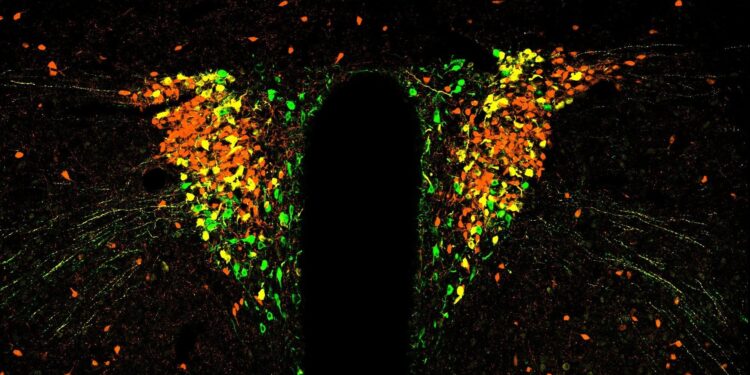The whole region of the brain called the paraventricular nucleus of the hypothalamus, where stress neurons are located. Credit: Neuroendocrinology center at the University of Otago
Research led by the University of Otago ōtākou Whakaihu Waka found that brain stress control cells accumulate and deactivate a constant rhythm approximately once per hour, even when nothing stressful occurs.
The associate professor of the author Karl Iremonger, the department of physiology of Otago and the center of Neuroendocrinology, says that these rhythms shape the models of activity and vigilance.
“These brain cell activity appears to act as a natural signal for” alarm clock “and often lead to an increase in stress or cortisol hormones.
“This world research first opens the door to explore how these models affect health, mood and sleep,” he said.
For the study, published in PNAThe researchers used an optical technique called photometry to follow the activity of the brain cells of mice and rats.
“This involved brilliant light in the brain of animals, allowing us to monitor the activity of brain cells on the day and night as animals were moving freely. We could then see how the activity of the brain is coordinated with sleep / wake models and stress hormones.”
A group of brain cells called neurons of corticotropin liberation hormones (CRH) has proven to be particularly important for the daily rhythms of the release of stress hormones.
High magnification of brain cells which control the release of stress hormones. Credit: Neuroendocrinology center at the University of Otago
“These neurons accumulate and go out in a regular scheme about once per hour. Interestingly, we found that these changes were coordinated with the sleep and awakening models, which suggests that the liberation model is coordinated with awakening or vigilance.
“We also found that when CRH neurons were artificially activated, it changed the behavior of animals – animals that were previously rested have become hyper -active.”
Professor Associate Iremonger says that research results can lead to a better understanding of how disturbed stress rhythms can cause mood changes and sleep disturbance.
Medicines that decrease the activity of CRH stress neurons can also be beneficial in the treatment of conditions associated with responses to hyperactive stress.
“Our new research helps us to understand how the brain controls these normal rhythms of stress hormones. Knowing how these brain signals work will help us to understand the links between stress hormones, vigilance and mental health.”
More information:
Shaojie Zheng et al, ultradian rhythms of activity, behavior and secretion of CRH PVN stress hormones, Proceedings of the National Academy of Sciences (2025). DOI: 10.1073 / PNAS.2510083122
Provided by the University of Otago
Quote: Brain cells controlling the stress switch on and deactivate in time cycles (2025, August 5) recovered on August 5, 2025 from
This document is subject to copyright. In addition to any fair program for private or research purposes, no part can be reproduced without written authorization. The content is provided only for information purposes.



